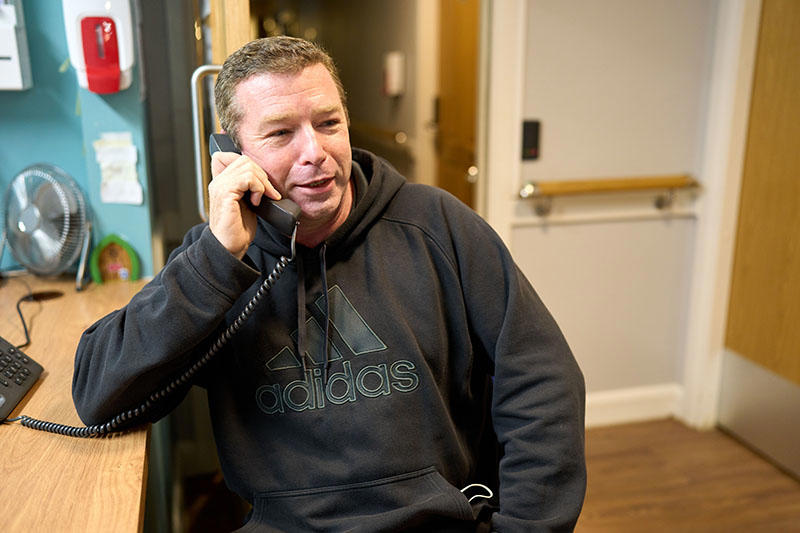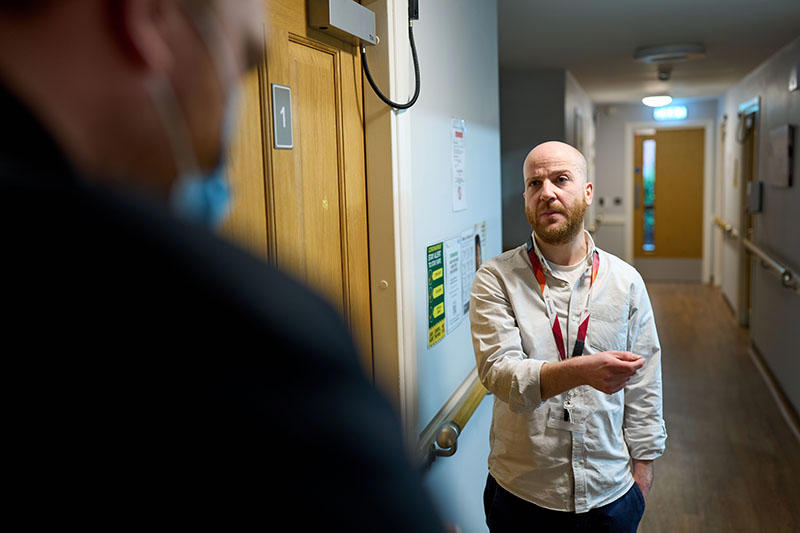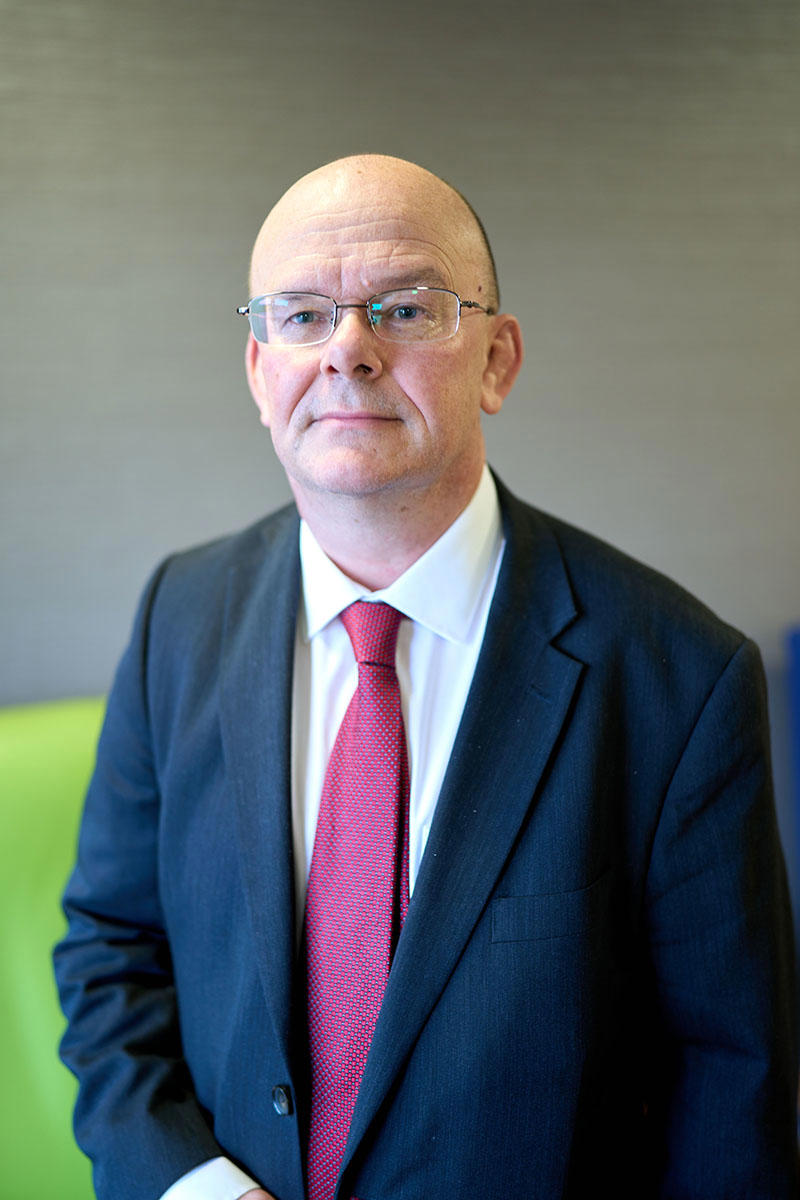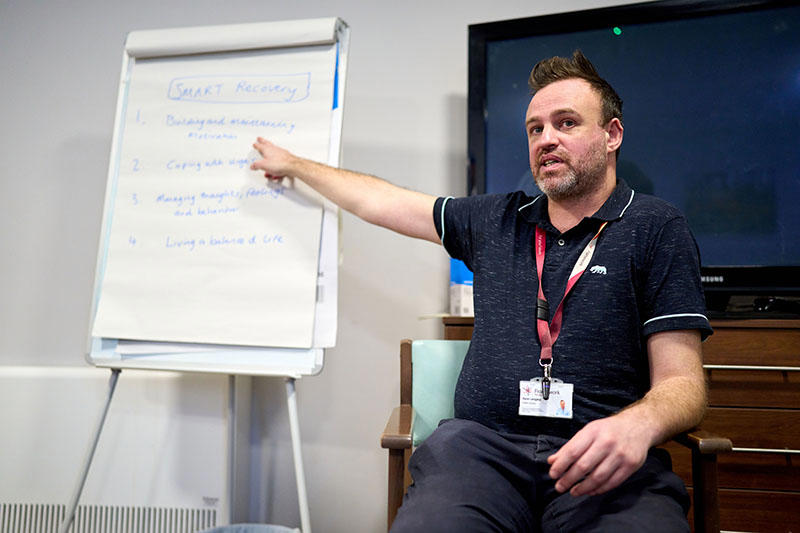‘You look much better already. You do.’ Philip Slater and Dominic Marshall are sitting in one of the group therapy rooms at The Level, an inpatient detox unit in Radford, Nottingham.
Mr Marshall, who only arrived three days prior, is finding his feet at the centre where staff will look to help him with his addiction issues and related health problems. He describes arriving at the centre as a late ‘Christmas present’.
Mr Slater, also a service user at The Level, is on hand with the reassuring words. Next to them is 35-year-old Jamie Stokes from Leicester, who has had a 20-year addiction to alcohol and whose health is ‘deteriorating rapidly’ with developing pancreatitis and liver cirrhosis chief among his concerns. It is, he says, ‘time to change’.
 ON THE MEND: Patient Gary Bull nears leaving the centre
ON THE MEND: Patient Gary Bull nears leaving the centre
Gary Bull, also from Leicester, has also been in the group session. He is nearing the end of his residential stay at the unit, which takes patients for up to 21 days.
The services wrapped around people such as Mr Bull include access to an addiction psychiatrist, GP support, group therapy sessions, gym exercise, Alcoholics Anonymous sessions, acupuncture and the support and guidance of peers and staff with lived experience. It is a process which has given the 52-year-old another change.
He says he is, understandably, nervous but optimistic about returning to the outside world. Mr Bull, who has been drinking for 40 years, found his problems spiralling owing to business difficulties and personal injury and realised things had gone too far when his 13-year-old son told teachers his dad was drunk in the mornings.
Mr Bull says his mood had suffered and was affecting those around him, that he had ‘lost interest’ and was ‘resentful’. ‘I don’t know what I was expecting but I came here prepared for the worst,’ he says. ‘But everyone was so welcoming.’
‘Most complex’ patients
The group of service users has just finished a group therapy session. Lunch, gym time and reflections on the day lie ahead. It is a world away from the general adult mental health units or psychiatric hospitals – or the much less supported community rehab schemes – that many of
these service users have experienced before.
 Centre manager Adam Sutcliffe
Centre manager Adam Sutcliffe
Things are very different here at The Level, which sits among the relics of what was once the industrial heartbeat of this city, near the former factories that made millions of Raleigh bikes.
At The Level, medical, psychological and social care all come together with everything from sleep pattern support to therapy available.
‘It’s a protective bubble, we put them in a safe, secure environment where we can work with them,’ the unit’s manager Adam Sutcliffe, a trained mental health nurse, says.
It’s a protective bubble, we put them in a safe, secure environmentAdam Sutcliffe
The centre was initially a 14-bed unit but owing to new Government money, resulting from Dame Carol Black’s independent review into drugs, a further six-bed space above the existing unit has been opened.
That funding – which appears to have breathed some optimism into the specialty – also allowed for the employment of a specialist GP, Marcus Bicknell. ‘It’s a fantastic experience,’ Dr Bicknell, who has worked in the city for decades and also represented GPs and patients on CCG (clinical commissioning group) and council committees, says.
‘These are the most complex patients that you really ever encounter in terms of the combination of mental health and physical health problems. ‘There’s a different kind of impact in being with someone for two or three weeks – something so tailored and so personalised and it is really quite special and moving.’
The Level is run by local housing charity Framework and works in partnership with Nottinghamshire Healthcare NHS Trust and a number of other charities and local organisations.
It was set up in 2018 after the NHS’s substance misuse service, The Woodlands, at the Highbury Hospital in the north of the city, closed down to make financial savings.
‘The politics of this are very important,’ Dr Bicknell says, describing the ‘massive harm’ of the 2012 Health and Social Care Act which took addiction services away from the NHS and placed them in local authorities, vulnerable to budget cuts. He says drug and alcohol services were decimated, causing harm to the most vulnerable patients.
Austerity’s impact
During The Doctor’s investigations into alcohol and addiction services two doctors from different local authority areas said their councils had removed around £1m from funding in their areas.
And one doctor said that in their area when the contract was taken away from the NHS and put out to tender, the local authority said it could only spend £110 per bed day – less than half of, or in some places even a third of the cost at most in patient units. It is a sorry scenario echoed across the country.
Andy Ball is a consultant addiction psychiatrist in Leicester and refers patients to The Level as the local inpatient unit closed when responsibility for services passed from the NHS to local authorities and money ran out. He says he is ‘very happy’ with The Level but wishes Leicester had its own local inpatient unit and describes service provision across the country as ‘incredibly sparse’. The knock-on effects of austerity politics are serious for patients and professionals.
Patients are ‘passed from pillar to post’ with services increasingly inaccessible and barriers some staff describe as ‘lacking compassion’ like not allowing smokers or veering away from difficult or complex patients.
There are now only a handful – a count of five in 2020 – of inpatient units in the country and the health service’s addiction psychiatrist workforce has been decimated. Many consultants being lost to other organisations and training posts no longer existing in many regions in the country with no NHS services for junior doctors to rotate through.
This has affected other parts of the health service. Numerous staff have told The Doctor there are now psychiatrists who lack training in this area and have to call GPs to ask for advice on treatment or prescribing, and expertise in the community is decreased too.
People who are very severely affected by alcohol and substance misuse can become very frequent users of the emergency care serviceSimon Walsh
Dr Ball says that, for example, in Leicester there is just one doctor training in the specialty – a specialty registrar.
And that doctor is only able to train because Dr Ball, who is employed by a third sector provider locally, is an established trainer and the registrar can travel to Nottingham to experience ward rounds at The Level, which is still able to offer training due to a close partnership with the local NHS trust.
On top of all of this, the country’s emergency departments – already stretched beyond measure – also bear the brunt of a lack of service provision and care in the community.
‘Unfortunately, people who are very severely affected by alcohol and substance misuse can become very frequent users of the emergency care service – some on a daily basis,’ London emergency medicine consultant Simon Walsh says.
‘That is very resource-consuming in managing those presentations but it’s also really disheartening and demoralising seeing the same people every day in their various states of decline and often eventually resulting in their death.’
Alcohol-fuelled harm
Consultant psychiatrist David Rhinds, who looks after patients at The Level, says: ‘We were on this trajectory anyway due to austerity, but lockdown and the pandemic have not helped.
We’re seeing the highest amount of drug and alcohol related harm and deaths we have ever seen.’ He says he is ‘deeply worried’ about the issues being stored up by huge increases in harmful drinking at home with domestic violence, safeguarding issues, family mental health and early childhood trauma likely to be growing sharply behind closed doors.
 RHINDS: ‘Highest amount of drug and alcohol-related harm we have ever seen’
RHINDS: ‘Highest amount of drug and alcohol-related harm we have ever seen’
These concerns go far beyond anecdotal evidence in one part of the country. The most recent NHS data for alcohol-related hospital admissions covers the pre-pandemic period of 2018/19 and reveals a record high of 1.26 million admissions.
Yet it is clear the problem has worsened significantly since then. In September 2020 – just six months into the pandemic – the Royal College of Psychiatrists found that nearly 8.5 million adults were drinking at ‘high risk’ levels, up from 4.8 million in February of the same year.
And the number of people addicted to opiates and seeking help had reached their highest number since 2015. ‘It’s remarkable really,’ Dr Bicknell says. ‘In the old days we would see someone with acute confusion as a result of alcohol-related problems probably about three or four times a year – we are now encountering acute confusion on a fortnightly basis due to the level of drinking, the lack of available treatment during COVID and the collapse of the whole care system really.
‘We are seeing a severity of pathology that is unprecedented.’
Funding slashed
In the face of so much need, the current state of care across the country is indefensible. Here, in Nottingham, doctors and other professionals have come together with a successful local charity to fill the vast vacuum – and they are doing so with such success and in such a crippled care landscape that patients are referred from half of the country, from miles north or south.
But surely it cannot be the case that the provision of crucial services is so reliant on personal relationships, third sector organisations and the individual drive of particular staff? When it comes to addiction services, universal healthcare appears to be a myth.
As Mr Sutcliffe says: ‘Too much rides on the individuals rather than the overall structure of provision.’ The BMA is calling for the public health grant allocated annually to local authorities in England to be restored to 2015/16 levels in order to begin to address this care crisis.
It is estimated that this would require £1.4bn additional funding by 2024/25, to give a total public health grant of £4.7bn by 2024/25.
Patients go from pillar to post… They do not have one place where all their needs are metJS Bamrah
A 2018 BMA briefing found that alcohol treatment services had seen their budgets cut by up to 90 per cent in areas that experience high levels of harm, with less than 20 per cent of dependent drinkers accessing alcohol treatment and the number in treatment falling despite a significant increase in need.
The report called for minimum standards in the provision of alcohol treatment services in England – as well as the restoration of funding. Senior NHS consultant psychiatrist and BMA board of science committee member JS Bamrah describes the reinstallation of comprehensive and universal NHS run or supported services in this area as ‘absolutely necessary’ for patients and the workforce.
He says: ‘Public health doesn’t get the funding and the resources it needs. If clinicians were running services they would not run it this way. It’s all a reflection of the 2012 act… the result was an obsession with tendering and the fragmentation and breaking up of services.’
 LEADING THE WAY: Therapeutic and structured activities co-ordinator Ryan Langley
LEADING THE WAY: Therapeutic and structured activities co-ordinator Ryan Langley
He adds: ‘Patients go from pillar to post… They do not have one place where all their needs are met. When patients come through our doors we don’t give them the best care we can – we can’t give them optimal care when it is so fragmented. I think that if we don’t tackle this we are making it a problem for our younger generations.’
Back in the group therapy room at The Level, the comforting smell of a chilli con carne hanging in the air, there are grimaces when the service users are asked about their experiences with health and care, prior to this apparent golden ticket of a place among the 20 beds of the unit. One of the group describes their experience in a psychiatric hospital.
He says it was ‘impossible to sleep’, that there was no ‘after care’ and adds: ‘I was straight back out to being alone.’ For this service user, and for so many other desperately needy people across the country this is the reality – a society which creates the conditions for their struggles and lacks the compassion to offer care in response.

